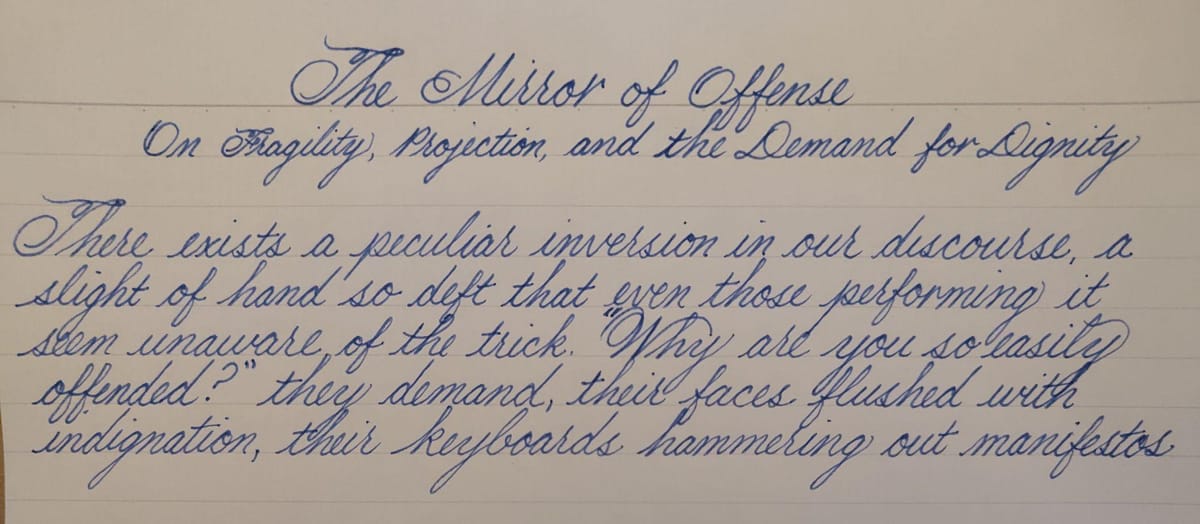The Mirror of Offense

On Fragility, Projection, and the Demand for Dignity

There exists a peculiar inversion in our discourse, a sleight of hand so deft that even those performing it seem unaware of the trick. "Why are you so easily offended?" they demand, their faces flushed with indignation, their keyboards hammering out manifestos about the supposed fragility of those who simply ask to exist without erasure. The irony would be comedic if the consequences weren't so grave.
Consider the anatomy of this accusation. A trans person requests the use of their pronouns—a basic courtesy we extend without thought when someone corrects the pronunciation of their name. The response? Rage. A treatise on biological essentialism. Accusations of thought policing and compelled speech. And then, without a hint of self-awareness, declare that trans people are too sensitive.
Who, precisely, is easily offended here?
The Architecture of Projection
This phenomenon reveals itself most starkly in those who position themselves as defenders of "free speech" while simultaneously working to silence trans voices. They create entire platforms dedicated to their offense at being asked to show basic respect. They craft legislation to ensure their offense carries the weight of law. They mobilize entire political movements around their deep, abiding offense at the existence of people who refuse to remain invisible.
Yet they call us fragile.
The detransitioners who transform personal journeys into public crusades against trans healthcare exemplify this perfectly. Not content with their own path, they demand the elimination of others' access to care. They align themselves with movements that seek not just gatekeeping but erasure. When trans people respond with alarm at attempts to eliminate their healthcare, their rights, their very existence from public life? This reasonable response to existential threat is labeled "hysteria" or "being easily triggered."
The same pattern emerges with those who fashion themselves as "LGB without the T." They take offense at the mere association with trans people, dedicate enormous energy to excising the T from LGBT, and then accuse trans people of being divisive when we point out the historical amnesia and strategic cruelty of their position. Our offense at their offense becomes, in their telling, the only offense worth discussing.
The Burden of Composure
Harvey Fierstein's 1983 interview with Barbara Walters illuminates this dynamic perfectly. Confronted with questions that would test anyone's patience—"What's it like to be a homosexual?" as if queerness were some exotic disease—Harvey maintained his composure, answered with grace, and gently educated. He had to. The burden of perfect composure always falls on the marginalized.
Watch any contemporary "debate" about trans rights. Trans people must remain perfectly calm while their humanity is questioned, their healthcare labeled child abuse, their existence framed as predatory. Show any emotion—any frustration, any anger, any exhaustion—and immediately the conversation shifts. "See how emotional they get? How can we have a rational discussion?" or how they are condemned by any stereotype that fits.
Meanwhile, their interlocutors rage about bathrooms, women's sports, and the supposed corruption of children with an intensity that borders on the unhinged. But this isn't seen as emotional. This is positioned as rational concern, righteous anger, justified offense.
The Weaponization of Respectability
"Everything is transphobic now," they cry, a rallying call that performs multiple functions. It minimizes genuine discrimination, positions trans people as unreasonable, and most crucially, preemptively justifies their own behavior. If everything is transphobic, then nothing is. If trans people are just "looking for reasons to be offended," then no examination of actual harmful behavior is necessary.
This weaponization of respectability politics serves to exhaust trans people into silence. Every microaggression must be weighed: Is this worth speaking up about? Will pointing this out make me seem "too sensitive"? Will my reaction be used as evidence that my community is "easily offended"?
The game is rigged. Silence is taken as consent. Speaking up is proof of fragility. The only winning move, it seems, is to not exist at all—which, of course, is the point.
The Fragility of Dominance
What drives someone to dedicate their life to opposing the dignity of others? What profound insecurity motivates campaigns against pronouns, against healthcare, against the simple acknowledgment that trans people exist and deserve respect?
The answer lies in the brittleness of hierarchies built on exclusion. When your sense of self depends on the subordination of others, their liberation feels like oppression. When your identity is constructed in opposition to a degraded Other, their dignity threatens your entire worldview.
This is why recycled prejudice of bygone eras, “special rights,” zero-sum rights or “taking my right(s) away”, various moral panic claims, and "I identify as an attack helicopter" becomes dog whistles and rallying cries. This is why grown adults have meltdowns over pronoun circles. This is why the mere existence of a trans child receiving support from their parents generates legislative panic. The offense taken is real, but it's not about pronouns or bathrooms or sports. It's about the terrifying possibility that the world is broader, more complex, and more beautiful than their narrow vision allows.
The Cost of Their Comfort
Every moment we spend defending our basic humanity is a moment stolen from our lives. Every carefully composed response to bad faith questions, every patient explanation of why we deserve healthcare, every gentle correction of malicious misgendering—these are taxes on our existence that others never have to pay.
And when we occasionally lose patience? When the ten thousandth person asks "What is a woman?" not from genuine curiosity but as a gotcha? When we express frustration at having to justify our existence again and again, or silently accept any number of microaggressions after a long series of them? That single moment of human emotion becomes evidence of our supposed fragility, while their sustained campaign of dehumanization is just "asking questions."
Who Breaks First?
The real question isn't why marginalized people sometimes lose patience. The question is how we maintain any patience at all. How does Sarah McBride venture into hostile territory and maintain her composure? How does Pete Buttigieg? How did Harvey Fierstein smile through Barbara Walters' ignorance? How do trans people continue to show up to "debates" where their humanity is the topic?
The answer is both heartbreaking and hopeful: We have no choice. Our existence depends on changing hearts and minds, on proving our humanity and personhood time and time again to those who would deny it. But also: We know our truth. We know our dignity. We know that their offense at our existence says nothing about us and everything about them.
The Mirror's Reflection
So when they accuse us of being easily offended, we might ask them to look in the mirror. Who writes legislation over pronouns? Who creates entire media ecosystems devoted to trans people in sports? Who obsesses over the genitals of strangers? Who takes such profound offense at being asked to show basic respect that they transform it into a political identity?
The easily offended are those who cannot bear to share a world where their comfort isn't centered, where their assumptions aren't law, where their prejudices aren't policy. They are offended by our existence, our resilience, our refusal to disappear. They are offended that we dare to demand dignity.
And yes, we are offended too—offended by the violence, the legislation, the constant dehumanization. But there's a difference between taking offense at oppression and taking offense at being asked to stop oppressing. One is a survival mechanism. The other is narcissistic injury.
The truth they cannot bear to acknowledge is this: Their entire worldview is so fragile that the mere existence of trans people living authentically threatens to shatter it. That's not our fragility. That's theirs. And all their sound and fury, all their accusations of our supposed sensitivity, cannot obscure this fundamental fact:
We're not the ones who break at being asked to show basic human respect. They are.
In the end, the question isn't why marginalized people are so easily offended. The question is why those in positions of privilege are so easily offended by requests for basic dignity—and why they've been allowed to project their fragility onto us for so long.
The mirror always tells the truth, if only they had the courage to look.
Jul 12, 2025

